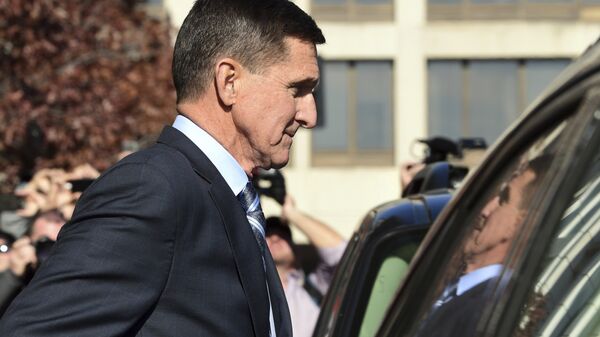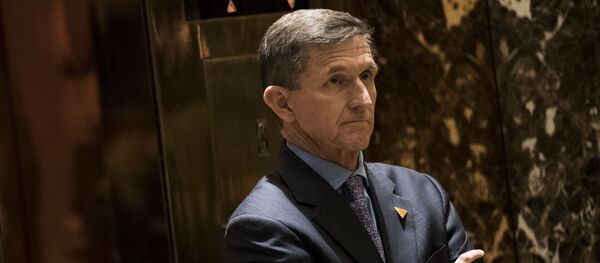The liberal "resistance" has taken Flynn's admission on Friday as prompting to start a victory lap, sure that the general was the first domino to fall and soon other administration officials would follow. And then, finally, US President Donald Trump would be impeached on collusion charges and all the world's problems would be solved.
Online opinions about Trump, positive or negative, don't have any bearing on whether he is guilty of collusion. Only actually committing collusion would make him guilty of collusion — and Flynn's guilty plea does not suggest collusion in any regard.
Flynn pled guilty to lying to the FBI about the specifics of his communications with Sergei Kislyak, at that time Russia's ambassador to the US, in December 2016 — but if one takes a moment to read what he and Kislyak actually talked about, a gaping hole opens in the collusion narrative.
This court filing about Michael Flynn is unbelievable!! Flynn's recount of what actually happened (point a onward), is extraordinary! pic.twitter.com/a9INRuQmUD
— Shehab Khan (@ShehabKhan) December 1, 2017
Flynn, then the incoming national security adviser, was contacted by Kislyak to discuss new sanctions levied by then-president Barack Obama against Russia for alleged interference in the US election. Flynn called a Trump transition team senior official and asked "what, if anything, to communicate to the Russian ambassador about the US sanctions."
Flynn then called Kislyak back and asked him to communicate to Moscow not to escalate the situation, "and only respond to the US sanctions in a reciprocal manner." Moscow ended up issuing no retaliatory sanctions at all, and Kislyak informed Flynn of this so he could pass it along to Trump.
Grand irony: the underlying action that Flynn now admits he lied to the FBI about was urging de-escalation with a nuclear power, which is now no longer permissible pic.twitter.com/Vh4Nxz0nWK
— Michael Tracey (@mtracey) December 1, 2017
Time for a wide-ranging criminal inquiry, along with endless Congressional investigations, into "Israeli interference"? pic.twitter.com/4TgAxW8zRn
— Michael Tracey (@mtracey) December 1, 2017
In other words, the incoming national security adviser discussed sanctions levied against Russia with the Russian ambassador. He urged the ambassador not to escalate the situation to prevent further tensions between the US and Russia. You may be asking yourself, "where's the crime?"
The answer is that in this, there is no crime. Flynn was simply doing his job. He lost the position of national security adviser a few weeks after assuming it for providing "incomplete information" about the Kislyak conversation to Vice President Mike Pence, and he pleaded guilty to lying to the FBI by telling them he didn't remember the specifics of the conversation.
But the actual contents of the conversation have not been called impermissible by any legal authority. Acting US Attorney General Sally Yates suspected that Flynn may have violated the Logan Act, a hoary federal law passed in 1798 that forbids unauthorized citizens from negotiating with foreign governments that are in a dispute with the US — but Flynn wasn't an unauthorized citizen. He was the incoming national security adviser.
.@AndrewCMcCarthy lays out some important points on the Michael #Flynn guilty plea. https://t.co/VVu8GbMuFF pic.twitter.com/2NrcmKY1qd
— Nick Short 🇺🇸 (@PoliticalShort) December 1, 2017
Michael Flynn pleads guilty to lying to the FBI, for the same exact things that @realDonaldTrump fired him for. Nothing to see here. Old news. Wake me up when you find something
— Stonewall Jackson (@1776Stonewall) December 1, 2017
"The reason why it'd be prohibitively difficult to charge Michael Flynn or anyone with violating the Logan Act is because of a legal concept called desuetude," former CIA agent John Kiriakou told Sputnik. "It holds that if a law is on the books for an extended period of time and is not used in a criminal case, it ceases to be a law. It doesn't even have to be removed from the books by an act of Congress."
The Logan Act hasn't been invoked in court since 1975, and nobody has been indicted under it since 1852. Any defense attorney worth their salt could invoke the doctrine of desuetude and have a whiz-bang legal defense for a client accused of violating the Logan Act. And even if some ace prosecutor is able to prove that Flynn did violate the Logan Act since he wasn't on the job just yet, that would only be a breach of protocol, not an indication of any sort of illicit collusion.
Caitlin Johnstone, a progressive journalist who is no ally of Trump, argued that if anything, Flynn's admission was damaging to the collusion narrative, not beneficial. Trump campaigned on repairing ties with Russia after years of tensions, and his incoming national security adviser enforced that policy. If Trump was truly a Russian bot or a shill or in Putin's pocket or whatever, he wouldn't need Flynn: he could simply contact his Russian allies directly and not let anyone know he had done it. Russia has consistently denied any collusion with the Trump campaign.
So the candidate who campaigned on a platform of getting along with Russia did indeed want to get along with Russia. The fact that he needed Flynn to negotiate de-escalations with them kinda kills the narrative that he'd been colluding with them to steal the election, though. https://t.co/MaSFjDYtsM
— Caitlin Johnstone (@caitoz) December 1, 2017
If Russia knew they had Trump in their pocket, they wouldn't need to be calmed down by Flynn. If Trump were colluding with Russia, he wouldn't have needed Flynn to contact them. If this was all planned, bringing someone in to smooth things over wouldn't have been necessary.
— Caitlin Johnstone (@caitoz) December 1, 2017



